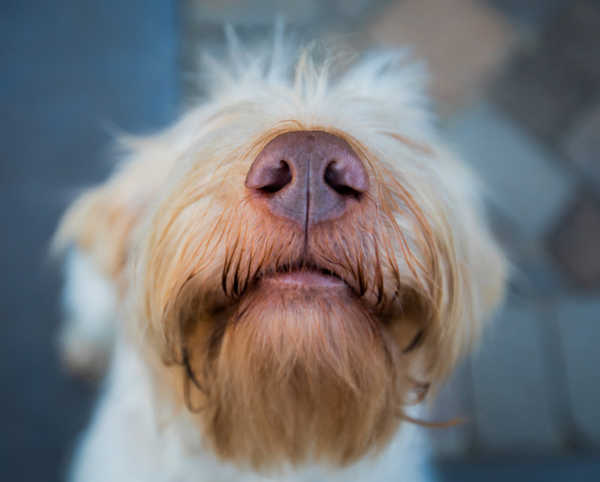
As a dog owner, you’ve more than likely become used to your dog panting. But something that may be new to you is when your dog breathes fast through their nose. This is opposed to the open-mouthed panting that may follow exercise or excitement.
As a veterinarian, fast breathing through the nose in dogs can indicate a number of issues to me, some more serious than others. Read on to find out what could be causing your dog’s fast breathing through their nose and what you can do about it.
Top signs of fast breathing through the nose in dogs – and what they mean
- More than 30 breaths per minute. The normal respiratory rate for most dogs is less than 30 breaths per minute (one breath on average in every 2 seconds). Dogs that are breathing fast through their nose may take more like 40-60 breaths per minute (one breath on average in less than 2 seconds)
- Flared nostrils. If a dog is fast breathing through their nose, it may cause their nostrils to widen to allow for more air intake.
- Labored breathing. When a pup is having difficulty breathing, they may also stand with their front legs wide, stretch out their neck, and cough. They will usually breathe with their mouth open as well and become so bad that their tongues and gums turn blue or gray.
- Shallow breathing where the chest doesn’t really fill with air. Some dogs will breathe so quickly that the lungs don’t have time to really fill with air.
- Stomach breathing where the abdomen is actively pushing air out.
- Fast breathing when at rest, lying down, or asleep. It’s not uncommon for a dog to have fast breathing through their nose after exercise or during times of stress, but fast breathing while resting or sleeping usually indicates that something is wrong.
- Wheezing, honking, or other noises while breathing. All of these could point to obstructions or irritations in the upper respiratory system.
Most likely reasons my dog is fast breathing through the nose
Most of the time fast breathing in dogs also comes with an open mouth. But that’s not always the case. Some causes of fast breathing through the nose are the same as those that cause excessive panting, and some causes are specific to breathing through the nose.
Here are some possible reasons your pup may have fast breathing through the nose.
- Stress: Unfortunately, our pups are subject to stress and anxiety the same way we are. It triggers that fight or flight response that also increases heart and respiratory rate. Some dogs won’t open their mouth when fast breathing and will instead breathe through their nose. Dogs may also shake, hide, tuck their tail, or not eat.
- Excitement: In the same way that stress causes an increased respiratory rate, excitement to see you come home at the end of the day may have your dog fast breathing through their nose. Watch out for wiggles and wags and maybe some jumping up and down as well.
- Aggression: A new dog in the neighborhood or an unexpected visitor may cause your dog some uneasiness that turns toward aggression and fast breathing. They may also growl, bare their teeth, or their body may stiffen.
- Exercise and play: So, you’ve just put your dog through the paces and they’re starting to calm down and rest up. It can take awhile for the respiratory rate to return to normal and while it’s doing so, some dogs will go from panting to fast breathing through the nose.
- Reverse sneezing: It’s a crazy phenomenon, and one that sounds more worrisome than it is. Reverse sneezing is when a dog sucks air in quickly through their nose instead of expelling air quickly as they would with a normal sneeze. What ends up happening is they will take multiple rapid breathes, make a terrible honking snort noise, and then eventually calm down.
- Illness: Respiratory infections, asthma, heart failure, allergies, cancer, and anemia, to name a few, can all cause a dog to breathe fast through their nose. This is usually because the illness impedes a pup’s ability to take in enough oxygen and the body speeds up the respiratory rate to try to fix it. You may also see a fever, decreased appetite, noisy breathing, decreased exercise, and pale gums with these illnesses.
- Discomfort: Pain from an injury or arthritis, nausea from an illness, or irritation from an allergen or foreign body can all cause a dog’s fast breathing. You may also notice crying or whining, difficulty getting up or moving around, drooling, not eating, coughing, sneezing, or nasal discharge.
- A few others: Some odd ball causes of fast breathing through the nose in dogs would be laryngeal paralysis where the muscles in the throat don’t work correctly, issues with the windpipe, or age-related changes to the airways.
Is fast breathing through the nose a reason to be worried?

Although fast breathing through the nose may not be something that you’re used to in your dog, it doesn’t always mean that something is wrong. Other times, it can be an indication that your dog needs to see a vet as soon as possible.
When is fast nose breathing normal?
If your pup just got back from a run or play session, chances are their fast breathing is normal. You can also expect fast nose breathing with exciting, stressful, or aggravating situations. Pay attention to your dog’s body language to determine if their fast breathing is related to these emotions. I’m also going to throw reverse sneezing in here even though it’s not technically normal, but it’s also not harmful either.
When is fast nose breathing not normal or a cause for concern?
Anytime your dog’s fast breathing through the nose also comes with other signs of difficulty breathing or illness, it’s a cause for concern. If they are having trouble getting enough air into their body, have blue or gray gums, are showing pain, or coughing and exercise intolerance, see your vet.
What can be tried at home to help a dog with fast breathing through the nose?
If you notice your pup breathing fast through their nose, consider the following:
1. Determine their emotional or physical state
First take a moment to determine their emotional state and what has been previously happening with them. For example:
- Did they just get done running around or playing?
- Was the mailman just here?
- Did they see a strange dog while out in the yard?
- Etc
All of these could mean that their fast breathing is just a side effect of exercise, stress, excitement or aggression.
2. Help your dog calm down
Give your pup a chance to calm down in a quiet space and see if their breathing slows down. If your pup starts to make a habit out of becoming stressed or aggressive, you may want to try to curb these behaviors by finding out what is causing them and cutting those things out of their life, if possible. In some cases, it’s not possible and you may need to try some behavior training to help them feel more comfortable. Speak to your vet for help with your dog’s specific issues.
3. Monitor for other signs
If none of those above questions are true, then start looking for other signs:
- Fever: read our article “How to Tell If Your Dog Has a Fever“
- Not eating,
- Difficulty breathing,
- Coughing, sneezing, or discomfort
All these signs above indicate that a veterinary appointment is needed.
When to see the vet for fast breathing through the nose
Again, if you feel like your dog’s fast breathing is exercise, stress, or emotion driven, wait and see. Offer them a quiet place to calm down and watch them to see that their respiratory rate returns to normal.
However, if your pup is in distress, having difficulty breathing, is painful, has a fever, isn’t eating, or is otherwise acting off, call your vet. Difficulty breathing can be especially dangerous because every tissue in a dog’s body needs oxygen to survive, and if your pup isn’t able to get enough air in, they are at risk for damaging those tissues.
You’ll also want to be in contact with your vet if you thought that your dog’s fast breathing was caused by exercise or stress but their respiratory rate doesn’t slow down with a few cleansing breaths and some down time.
How will the vet treat fast breathing through the nose in dogs?
Your vet’s first concern is to get your dog stable. If they are having difficulty breathing, they will want to get them on some oxygen before anything else.
Diagnosis
If your pup is just breathing faster than normal without the difficulty, the vet will start with a history and exam. Be ready to answer questions about when the fast breathing started, other signs, and what was happening when you noticed it.
They will look at the whole body, listen to the heart and lungs, take a temperature and look for areas of pain or discomfort. From there, blood work and imaging may be needed. Respiratory illnesses, foreign bodies, or tumors may require your vet to go the extra mile and use endoscopy to find out exactly what you’re dealing with.
Should I record a video of my dog’s fast breathing?
As is often the case, it can be hard to get your dog to do the fast breathing through their nose that you are seeing at home. Recording a video when you see it can help get your vet an idea of what you’re seeing and can be very helpful in diagnostics. Be sure to include sound for the greatest benefit.
Treatment
Some cases of fast breathing through the nose in dogs isn’t going to require treatment. Reverse sneezing, excitement, stress, and exercise are all normal causes where the best you can do is try to calm your dog until their respiratory rate decreases.
Respiratory illness will often require medications to clear infections and open up airways to increase airflow. Tumors may require surgery for removal, if possible, and foreign objects will need to be removed.
Heart disease and other illnesses will need medications to help manage and pain will need to be addressed.((https://veterinarypartner.vin.com/default.aspx?pid=19239&id=4952493))
Cost
An exam is going to cost anywhere from $50-$100 with diagnostics adding another $50-$200 or more. Treatments are going to vary greatly and can include antibiotics for $20 or tumor removal surgery for $2,000+.
What will happen if fast breathing through the nose is left untreated?
Oxygen intake is extremely important for your dog’s body. If there’s something that is keeping that oxygen from getting to where it should go, your dog may be in serious trouble. Without the proper amount of oxygen, tissues and organs can become damaged, sometimes permanently, and even fail leading to death. Always be sure to see you vet if you’re at all concerned about your dog’s fast breathing through the nose.
References:
https://veterinarypartner.vin.com/default.aspx?pid=19239&id=4952493
https://www.petmd.com/dog/symptoms/heavy-breathing-dogs
https://www.rmvccolorado.com/site/blog/2022/03/15/why-is-my-dog-breathing-so-fast
Disclaimer: This website's content is not a substitute for veterinary care. Always consult with your veterinarian for healthcare decisions. Read More.


Be the first to comment